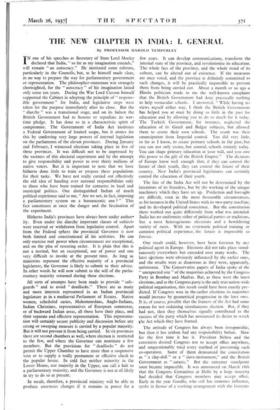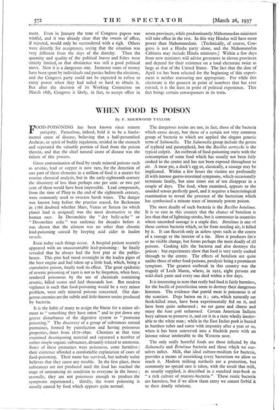THE NEW CHAPTER IN INDIA : I. GENERAL
By PROFESSOR HAROLD TEMPERLEY
IN one of his speeches as Secretary of State Lord Morley declared that India, " so far as my imagination extends," will remain " an autocracy." He instituted some reforms, particularly in the Councils, but, as he himself made clear, in no way to prepare the way for parliamentary government or representation. The philosopher-statesman was strangely shortsighted, for the " autocracy " of his imagination lasted only some ten years. During the War Lord Curzon himself supported the Cabinet in adopting the principle of " respons- ible government " for India, and legislative steps were taken for the purpose immediately after its close. But the " diarchy " was a transitional stage, and on its failure the British Government had to honour or repudiate . its war- time pledge. It has done so in a characteristic spirit of compromise. The Government of India Act institutes a Federal Government of limited scope, but it atones for this by conferring very large powers of internal legislation on the parliaments of the eleven provinces. During January and February, I witnessed elections taking place in five of these provinces. It was difficult not to be impressed by the vastness of this electoral experiment and by the attempt to give responsibility and power to over thirty millions of native voters. But it is important to note that we have hitherto done little to train or prepare these populations for their tasks. We have not really carried out effectively the old idea of handing over national responsibilities only to those who have been trained for centuries in local and municipal politics. One distinguished Indian of much political experience said to me, " Are we not, in fact, imposing a parliamentary system on a bureaucratic one ? " This fact constitutes at once the danger and the fascination of the experiment.
Hitherto India's provinces have always been under author- ity. Even under the diarchy important classes of subjects were reserved or withdrawn from legislative control. Apart from the Federal sphere the provincial Governor is now both limited and constitutional in his activities. He can only exercise real power when circumstances are exceptional, and on the plea of restoring order. It is plain that this is not a normal, but an exceptional, use of power and one very difficult to invoke at the present time. As long as ministries represent the effective majority of a provincial legislature, the Governor is likely to submit to their advice. In other words he will now submit to the will of the parlia- mentary majority returned during these elections.
All sorts of attempts have been made to provide " safe- guards " and to avoid " deadlocks." There are as many and more interests represented in an Indian provincial legislature as in a mediaeval Parliament of Estates. Native women, scheduled castes, Mahommedans, Anglo-Indians, Indian Christians, representatives of European commerce, or of backward Indian areas, all these have their place, and their separate and effective representation. This representa- tion will certainly secure publicity and discussion before any strong or sweeping measure is carried by a popular majority. But it will not prevent it from being carried. In six provinces there are second chambers as well, where election is restricted to the few, and where the Governor can nominate a few members. But the provisions for " deadlocks " do not permit the Upper Chamber to have more than a suspensive veto or to supply a really permanent or effective check to the popular house. In cold fact neither minority in the Lower House, nor majority in the Upper, can call a halt to a parliamentary majority, and the Governor is not at all likely to try to do so at present.
In result, therefore, a provincial ministry will be able to produce enormous changes if it remains in power for a few years. It can develop communications, transform the internal state of the province, and revolutionise its education. The whole face of the province, and the whole trend of its culture, can be altered out of existence. If the measures are once voted, and the province is definitely committed to such changes, it will be practically impossible to prevent them from being carried out. About a month or so ago a Hindu politician made to me the well-known complaint that the British Government had done practically nothing to help vernacular schools. I answered, " While having no views myself either way, I think the British Government has helped you at once by doing so little in the past for education and by allowing you to do so much for it today. The Turkish Government, for instance, neglected the education of its Greek and Bulgar subjects, but allowed them to create their own schools. The result was their emancipation from Imperial control. You did very little, so far as I know, to create primary schools in the past, but you can not only create, but control, schools entirely today. You can shape primary education at your will, and you owe this power to the gift of the British Empire." The dictators of Europe know well enough that, if they can control the future of their youth, they can control the future of their country. New India's provincial legislatures can certainly control the education of their youth.
The fate of the India Act will not be determined by the intentions of its founders, but by the working of the unique machinery which they have set up. Prediction and foresight are difficult, even in the most favourable circumstances, as for instance in the United States with its two-party machine, and its developed political conscience. But the constitution there worked out quite differently from what was intended. India has no uniformity either of political parties or traditions, but a most heterogeneous electorate and a bewildering variety of races. With no systematic political training or common political experience, the future is impossible to foresee.
One result could, however, have been foreseen by any political agent in Europe. Elections did not take place simul- taneously everywhere but extended over many weeks. The later elections were obviously influenced by the earlier ones, and the results were as disastrous as they were, apparently, unforeseen. The Conservative papers of India spoke of the " unexpected size " of the majorities achieved by the Congress Party in Bombay and Madras. But, as these were the latest elections, and as the Congress party is the only true nation-wide political organisation, this result could have been exactly pre- dieted. If Congress won in the earlier elections its majorities would increase by geometrical progression in the later ones. It is, of course, possible that the framers of the Act had some reason for not ordaining simultaneous election. But, if they had not, then they themselves signally contributed to the success of the party which has announced its desire to wreck the Act which they have framed.
The attitude of Congress has always been irresponsible, but then it has seldom had any responsibility before. Now for the first time it has it. President Nehru and the extremists desired Congress not to accept office anywhere, and unquestionably tried every method of preventing such co-operation. Some of them denounced the constitution as " a day-doll " or a " slave-instrument," and the British Government as " satanic." But the extremer standpoint soon became impossible. It was announced on March i8th that the Congress Committee at Delhi by a large majority had decided that Congress members may accept office. Early in the year Gandhi, who still has immense influence, spoke in favour of a working arrangement with the Govern- meat. Even in January the tone of Congress papers ,was wistful, and it was already clear that the sweets of office, if rejected, would only be surrendered with a sigh. Others were directly for acceptance, seeing that the situation was very different from the days of the diarchy. Then the quantity and quality of the political loaves and fishes were strictly limited, so that abstinence was still a good political move. Now it is a dangerous one. Immense sums of money have been spent by individuals and parties before the elections, and the Congress party could not be expected to refuse to enjoy power when they had toiled so hard to obtain it. But after the decision of its Working Committee on March 18th, Congress is likely, in fact, to accept office in seven provinces, while predominantly Mahommedan ministers will take office in the rest. In this way Hindus will have more power than Mahommedans (Technically, of. course, Con- gress is not a Hindu party alone, and the Mahommedan Cabinets may include Hindu ministers.) Within a few days from now ministers will advise governors in eleven provinces and depend for their existence on a total electorate twice as large as that of the United States. The fact that the date of April ist has been selected for the beginning of this experi- ment is neither reassuring nor appropriate. For while this electorate is the greatest in point of numbers that has ever existed, it is the least in point of political experience. This fact brings certain consequences in its train.











































 Previous page
Previous page